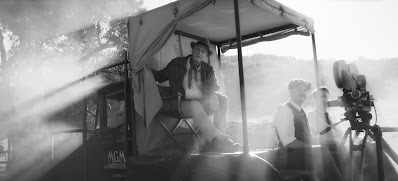At first glance, David Fincher would seem like an odd choice to direct Mank (2020), a biopic about Herman J. Mankiewicz and the events that led to him writing the script for Orson Welles' film Citizen Kane. After all, Fincher is primarly known for making dark and violent thrillers that explore serial killers, psychopaths, and criminal deviants. Some may say that Fincher made Mank to pay tribute to the memory of his father, Jack Fincher, a screenwriter and journalist who wrote the script for Mank back in the 1990s. This may be true, but upon closer inspection, Mank also fits neatly into Fincher's explorations into the darker side of human nature. Now, instead of telling the story of a serial killer, Fincher is exploring the sociopathic behavior of the Hollywood studio system of the 1930s, a system that brutally manipulated its artists to conform to the demands of capitalism. With Mank, Fincher has created a brillaintly evocative portrait of the all encompassing power struggle in Hollywood between art and commerce.
Mank alternates between the early 1930s, when Herman J. Mankiewicz (Gary Oldman) worked as a screenwriter for Louis B. Mayer (Arliss Howard) at MGM, and the early 1940s, when Orson Welles (Tom Burke) hired Mankiewicz to write the script for Citizen Kane for his independent production company RKO Pictures. The film shows how during both time periods, Mankiewicz struggled with alcoholism and his own personal demons, which often got in the way of his work as a screenwriter. As portrayed by Gary Oldman in an astonishingly powerful performance, Fincher shows Mankiewicz as a fiercly independent and outspoken artist whose mercurial personality led to him eventually being ostracized from Hollywood, and into the employ of the equally strident Welles.
Some have accussed Mank of supporting Pauline Kael's assertion that Mankiewicz deserved sole credit for the writing of Citizen Kane over Welles. However, Fincher doesn't portray in-depth the extended period when Mankiewicz and Welles fought over writing credit. He briefly alludes to this issue at the end of the film, with an audio clip of Orson Welles actually acknowledging Mankiewicz's contribution to writing the script for Citizen Kane. Instead, Fincher focuses primarly on Mankiewicz's career at MGM in the 1930s before he even wrote Citizen Kane. The 1940s period when Mankiewicz is actually writing the script for Citizen Kane is just the framing story device for Mank, and Welles himself only has a few scenes in the film.
What Mank is really about is the insidious nature of Hollywood in the 1930s, and how the greed and corruption of the studio system drove Mankiewicz away from it, and into the more independent arms of Orson Welles and RKO Pictures in the early 1940s. Fincher shows how the ruthless newspaper tycoon William Randolph Hearst (Charles Dance) had a stranglehold over MGM and its studio heads Louis B. Mayer and Irving Thalberg (Ferdinand Kingsley). Mayer is portrayed as a smooth talking, heartless businessman who feels no qualms about slashing the payroll of his employees in order to maximize his own personal wealth. Behind the funding for Mayer's and Thalberg's films is the financial backing of Hearst, who is revealed as being more interested in showing off his vast wealth and pleasing his mistress Marion Davies (Amanda Seyfried) then in the actual art of filmmaking.
On an aesthetic level, Fincher films Mank in gorgeous black and white, and uses various filters and effects, such as a muffled audio soundtrack, scratches on the film stock, and film reel change markers, to replicate the look and feel of a classic Hollywood film. Also, the acting and dialogue is portrayed in a sometimes exaggerated and heightened style to resemble classic 1930s/1940s Hollywood studio films such as Design For Living and Woman of the Year. There's an especially amazing sequence when Mankiewicz takes a walk with Davies through Hearst's animal-filled garden, as they exchange a rapid fire dialogue exchange that recalls Howard Hawks' screwball comedy His Girl Friday.
The last act of Mank, which takes place at a costume party dinner hosted by Hearst in his mansion, is just as astonishing and frightening as any scene from one of Fincher's thrillers. Now, instead of his protagonist confronting a serial killer, Fincher has his main character take on the equally heartless and immoral Hearst. Although he doesn't physically murder anyone like Fincher's previous gallery of sociopathic villains, Hearst is portrayed as a master manipulator whose lust for power and control leads to death and destruction. Charles Dance gives a quietly chilling performance as Hearst that recalls John Huston's similarly startling character in Chinatown. When Hearst guides Mankiewicz out of his mansion after the costume party, telling him the story of the monkey organ grinder, Fincher and Dance masterfully create a sense of impending and all-consuming dread.
With Mank, Fincher has moved beyond the killers and social deviants of his previous films like Fight Club, Seven, and Zodiac, and instead broadened his examination of the evils of human nature onto the macro scale of Hollywood and the capitalist system that it feeds off of. It's no coincidence that Fincher alludes to Welles' production of Heart of Darkness early in Mank, as he is interested in revealing the dark, beating pulse of a film industry that values commerce over all else.
Just as studios like MGM in the 1930s relied on merciless businessman like Hearst to bankroll their films, many modern studios are similarly run by executives who use power and domination as measuring sticks for success. Although he is a troubled, imperfect protagnoist, due to his struggles with alcoholism and his abrasive personality, Mankiewicz is ultimately portrayed by Fincher as a heroic figure who was punished by Hollywood for taking on a system that needed to be changed. Mank is Fincher's homage to iconoclasts, such as Mankeiwicz and Welles, who had the courage to create art not for the purpose of making a buck, but for expressing their own unique voices.





